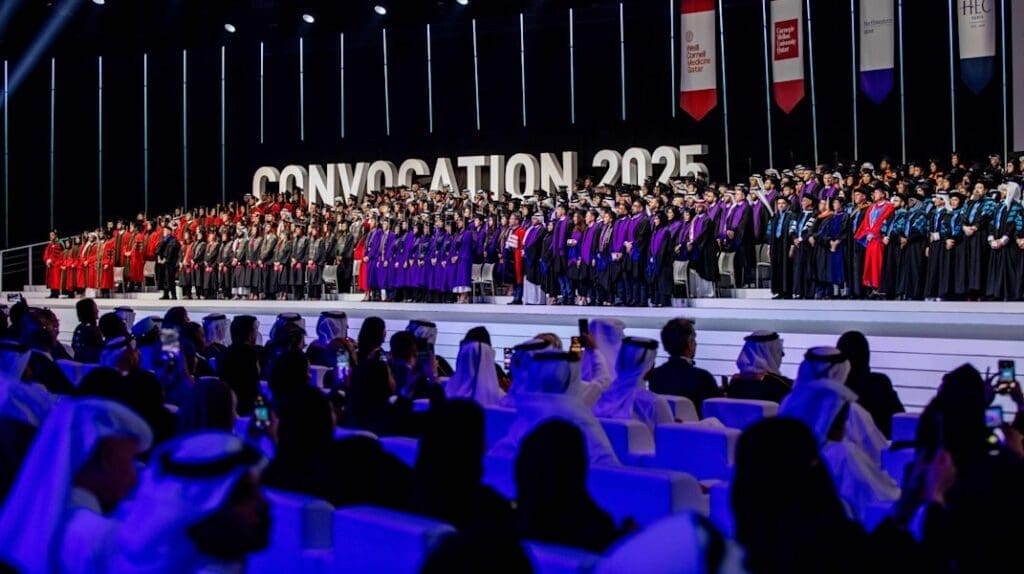Prior to Donald Trump’s historic trip to the Gulf seeking investments for the American economy, the U.S. president was busy taking a wrecking ball to his country’s universities and research institutions. The Elon Musk-led Department of Government Efficiency, or DOGE, was decimating everything from medical research to the National Oceanic and Atmospheric Administration, and hundreds of projects from the National Institutes of Health were abruptly, and seemingly arbitrarily, defunded. High on Trump’s list was dismantling the U.S. Department of Education, and his administration froze hundreds of millions of dollars allocated to universities to crack down on things like diversity, equity and inclusion (DEI) programs and pro-Palestine campus protests. In the latter case, immigrant students were also targeted for their political views, and professors—including Cemal Kafadar and Rosie Bsheer of Harvard University—were dismissed from their posts.
Yet amid the wreckage of these heavy-handed moves is a golden opportunity for other countries. Trump’s anti-institutional policies are likely to produce a brain drain at home. While Gulf states have their motives for investing in the U.S. economy, they could also benefit from channeling the flow of talented researchers out of the U.S. into their own institutions.
GCC governments have long proclaimed that the post-oil future lies in a knowledge economy. The region’s significant strides towards a competitive higher education landscape include the establishment of branch campuses of internationally renowned institutions, a growing number of students and researchers, and the rise of regional universities in global rankings.
Therefore, GCC countries have much to offer to academic exiles from the U.S.: Funding and salaries are competitive, and the university and research ecosystem is expanding. Moreover, in contrast to Europe, the region is not plagued by austerity, economic stagnation and increasing encroachments by far-right politics. This makes the Gulf attractive, especially for ethnic and religious minorities suffering from discrimination. Qatar, in particular, offers a haven for academics and students who are persecuted for voicing their opposition to the genocide in Gaza. Geographically, the Gulf is conveniently equidistant between the big academic centers in Europe and China.
Punching Above Their Weight?
However, much needs to be done to compete with the global heavyweights. Despite the confident announcements and projections, regional higher education often does not receive sufficient attention or funding. For example, the United Arab Emirates’ federal higher education budget has decreased since 2017, even as student numbers have multiplied. Megaproject plans like NEOM in Saudi Arabia see university education and research as an afterthought, at best.
The strategy of attracting branch campuses—despite some successes like New York University in Abu Dhabi and Carnegie Mellon University in Doha—seems to have petered out. Their number has stagnated, and they have been weighed down by their frequent emphasis on teaching over research, relative neglect by their parent institutions, and the presence of low-quality or outright fraudulent institutions in their host countries.
Similarly, homegrown universities have seen mixed progress, with successful flagships like Qatar University in Doha and King Fahd University in Dhahran, Saudi Arabia contrasting with less successful experiments like Masdar Institute in Abu Dhabi and the reorganized Zayed University in Dubai. Moreover, the region’s celebrated advance in university rankings has been mired in controversy.
Attracting academic “refugees” from the U.S. is a great opportunity for the Gulf, especially in places that are currently in transition or expansion, such as Qatar’s Education City, as it considers a replacement for its Texas A&M campus. But more is needed to improve the regional university and research ecosystem, which is still making its way from the global periphery. Such a push would include putting higher education and research truly at the center of national strategies; allocating appropriate funding; renewing efforts to create and expand universities and research centers; and forming strong coordinating institutions and infrastructure modeled after the immensely successful national science foundations of countries like the United States, Switzerland and Singapore.
Toward Regional Synergies
Vital to these efforts is the transcendence of the narrow national perspective. GCC countries need to replace the current spirit of isolation and competition in university education and research with a spirit of regional coordination and cooperation. No GCC country alone will be able to achieve the necessary critical mass of researchers and top institutions. Instead, they should institutionalize regional coordination in a strong, well-funded regional science body modeled after successful frameworks, such as the European Union’s Erasmus+ program for academic mobility, the Marie Sklodowska-Curie Actions for research training, and the—now gutted—U.S. National Science Foundation for competitive grants.
Key initiatives could include GCC-wide student and faculty exchange programs, joint degree offerings between universities and multinational research ventures—particularly in flagship areas such as renewable energy, biomedical sciences and artificial intelligence (AI). A structured funding mechanism, including competitive regional research grants and merit-based scholarships, would incentivize collaboration. To ensure momentum, this body could initially focus on a high-impact regional “moonshot” mission—such as pandemic resilience or sustainable urban development—leveraging pooled resources and expertise. By aligning accreditation standards, harmonizing research funding and fostering cross-border academic partnerships, the GCC can cultivate a globally competitive knowledge economy while harnessing economies of scale and reducing redundancies and fragmentation.
Finally, the current crisis in the U.S. demonstrates that threatening academic freedom means threatening academia itself. The lesson for the GCC, according to Emirati sociologist Mira Al Hussein, is to make the region’s academic institutions “free zones for academic thinking,” granting them a kind of “extraterritoriality” in terms of the freedom of research and expression that is increasingly endangered in other parts of the world.


